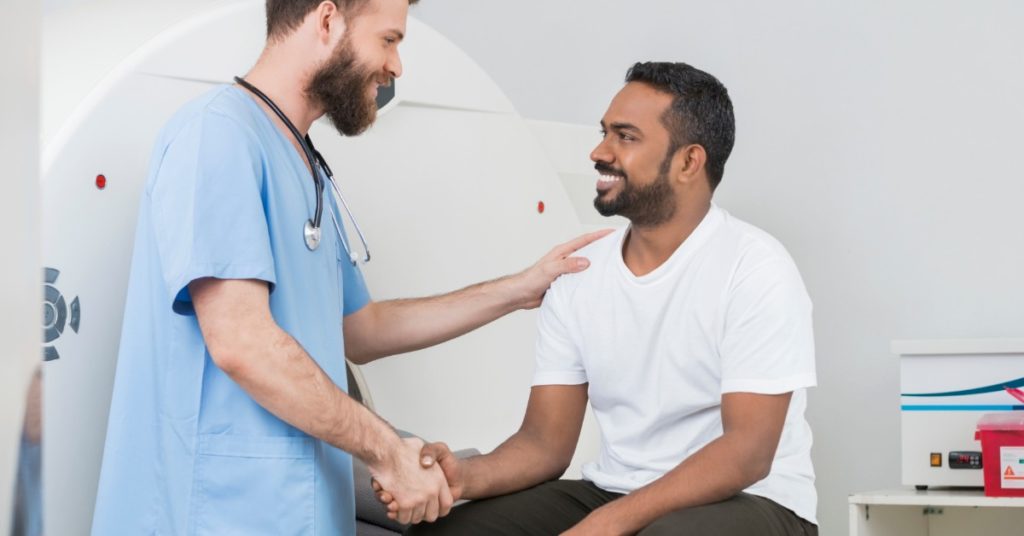To people who are unfamiliar with the world of medical imaging, understanding the differences between the different scans may be confusing. When is one ordered over the other, which one is better, and which one is safer? As with much of the medical field, the answer is — it depends. Before your provider refers you for any medical imaging test, they will review your entire case and your history. They will decide which diagnostic scan better suits your situation.
In today’s post, we will review the difference between an MRI and a CT scan is and which one is the better option for you. At Touchstone Imaging Center, most of our locations offer both MRI and CT services, in addition to a variety of other medical imaging procedures. Our technologists are experienced and able to discuss your options with you.
What is an MRI?
An MRI is a non-invasive procedure used to look at the inside of your body. The MRI machine uses a strong magnetic field and radio waves to create very detailed 3D images of the body’s internal structures including the hard and soft tissues. The cross-sectional views allow your radiologist and physician the ability to see inside organs and tissue to identify issues that may not show up on x-ray.
What is a CT Scan?
A computed tomography, also called a CT scan or a CAT scan, is a medical imaging machine that uses cross-sectional x-rays to produce detailed images of the inside of the body. The multi-angle images are compiled to create sliced images of the organs, bones, or blood vessels.
Which diagnostic scan is safer?
In terms of safety, at the risk of sounding like a broken record, it really depends. Both MRI and CT scans are relatively safe.
MRI scanners use a large magnetic field to create images, which can react to the metal in or on the body. So, if you have metal in your body, the CT scan would be the safer option. However, a CT scan uses a combination of several x-rays to create a detailed image. Because the technology uses radiation, it is not safe for unborn babies, so if you are pregnant, an MRI is much safer. Overall, both diagnostic imaging technologies are relatively safe. When you are referred for any kind of scan, your personal risks versus benefits will be weighed. In both of the examples listed above, modifications can be made to make the scan safer. Your technologist will review all of the safety concerns with you to reduce risks of injury.
Which one is more comfortable?
From the patient experience perspective, both an MRI and a CT scan are pretty similar. Both feature a sliding table and a tube-like machine that takes the images. Both are relatively comfortable and your technologist makes every effort to make the experience more comfortable by offering warm blankets, music, and sometimes posters, art, or light covers that are entertaining or relaxing to look at. Both procedures take between 15 and 45 minutes, so most patients use this time as an opportunity to relax or catch a short nap. The good news is, both MRI and CT scan are non-invasive and painless. Because of the open-donut shape of the CT scan machine, patients who suffer from claustrophobia are much more comfortable in a CT scanner than an MRI, but both machines can be accommodating to those who suffer from anxiety or claustrophobia.
What can each procedure diagnose?
Both an MRI and a CT scan can view internal body structures. Both are used to look more closely at body tissues that were either normal or difficult to visualize on an x-ray. MRI technology is used to view joints, brain, breast, heart, or blood vessels. They are useful for viewing herniated discs, torn ligaments, and soft-tissue injuries. CT scans are used to find bone fractures, tumors, and identify internal bleeding. CT scans are particularly useful at identifying the source of a stroke and the source of internal abdominal bleeding. MRI scans can provide more detail in soft organs than a CT scan.
As you can see, MRI and CT scans are very different and relatively similar. They both offer a look inside your body that no other technology can, which is invaluable in diagnosing and formulating an effective treatment plan. If you are referred for a medical imaging test, including an MRI or CT scan, visit us online to find a Touchstone Imaging Center near you and schedule your appointment today!

